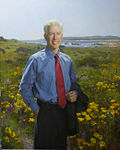California gubernatorial election, 2002
|
|
|||||||||||||||||||||
|---|---|---|---|---|---|---|---|---|---|---|---|---|---|---|---|---|---|---|---|---|---|
|
|||||||||||||||||||||
|
|||||||||||||||||||||

County Results
|
|||||||||||||||||||||
|
|||||||||||||||||||||
The 2002 California gubernatorial election was an election that occurred on November 5, 2002. Democrat Gray Davis defeated Republican Bill Simon by 5% and was re-elected to a second four-year term as Governor of California. Davis would be recalled less than a year into his next term.
The 2002 gubernatorial primary occurred in March 2002. Gray Davis faced no major competitor in the primary and won the nomination. Simon defeated former Los Angeles Mayor Richard Riordan in the Republican primary. Gray Davis ran a series of negative ads against Riordan in the primary. Riordan was seen as a moderate and early state polls showed him defeating Gray Davis in the general election.
During the 2002 election campaign, Davis took the unusual step of taking out campaign ads during the Republican primaries against Los Angeles mayor Richard Riordan. Davis claimed that Riordan had attacked his record and that his campaign was defending his record. Polls showed that, as a moderate, Riordan would be a more formidable challenger in the general election than a conservative candidate. Polls even showed that Riordan would defeat Davis. Davis attacked Riordan with negative ads in the primary. The ads questioned Riordan's pro-choice stance by questioning Riordan's support of pro-life politicians and judges. The ads pointed out Riordan's position of wanting a moratorium on the death penalty as being to the left of Gray Davis, who strongly supported it.
In 2000, the United States Supreme Court in California Democratic Party v. Jones struck down California's blanket primary. With the end of the blanket primary, only non-partisans and registered Republicans could vote for Richard Riordan in the 2002 primary. The end of the blanket primary made it more difficult for the more moderate Riordan. It has long been known in politics that primary voters are much more ideological and strongly liberal or strongly conservative than those who vote in the general election.
...
Wikipedia



